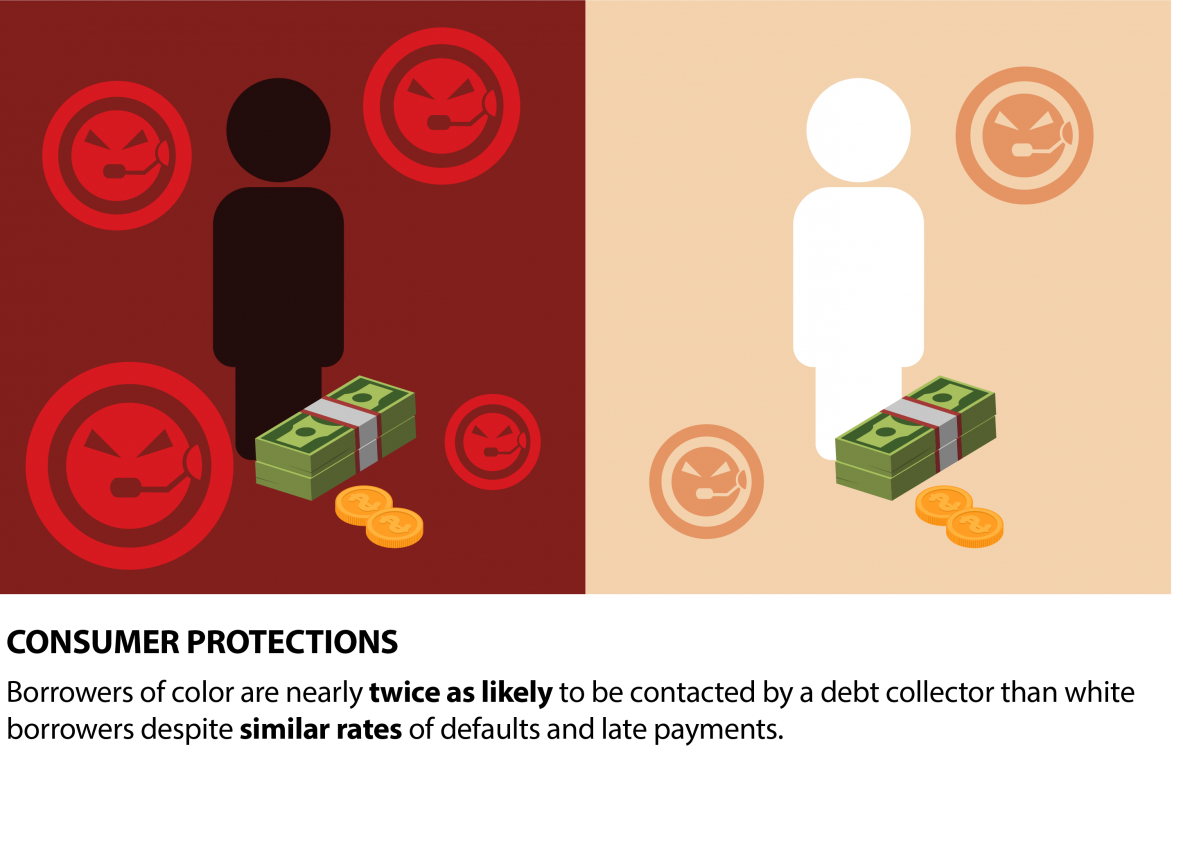Consumer Rights and Protections
Unfair and predatory business practices that cause hardship for consumers are widespread throughout the country, and Maine is no exception.
While things have changed somewhat since the Great Recession, which was caused by such practices just over a decade ago, some financial institutions and debt collectors have continued to exploit and pursue legal loopholes that allow them to make an unfair profit from low- and moderate-income consumers. People with low income and people of color are the most impacted by consumer rights abuses.

African American and Latinx borrowers were three times as likely to be sold subprime loans in the lead up to the 2007 financial crash, even if they had good credit. After the crash, most of the nation's big lenders, from Wells Fargo to Countrywide, would go on to be fined for racial discrimination. And while the crash cost us all, in the form of lost wealth, homes, jobs, savings, or some other economic impact, the recovery looked very different for Black Americans and that unequal recovery has led to a widening of the racial wealth gap in America. We are already seeing a similar pattern of an unequal recovery begin to emerge under COVID-19 relief efforts.
While people across the income and wealth spectrum are impacted by the COVID-19 crisis, ensuring that financial services are safe and affordable is especially critical for those struggling to preserve their homes, cars, and funds for medical care and other necessities, usually without the savings or family or community support that wealthier families have.
- Maine should prohibit predatory financial products that are designed to extract wealth from people who are struggling financially. Land installment contracts are an example of such a product. They are offered to people who don't qualify for a traditional mortgage loan, and represent a false hope. Land installment contracts promise eventual home ownership, but unlike a traditional mortgage, the consumer never owns the property and instead makes payments to the property owner - usually on unaffordable terms - essentially living there as a tenant. These contracts almost always end with the consumer losing their home and all the money paid toward the contract. Maine should prohibit such contracts or at the very least extend the same rights and protections to these consumers that people have in the traditional foreclosure process.
- As more Mainers will need to rely on different forms of debt to make ends meet during this economic crisis, Maine should close loopholes in the court process that 3rd party debt buyers exploit, allowing them to violate people's due process rights.
- Debt collectors should not be allowed to push families into poverty. When creditors or debt buyers sue borrowers and win court judgments against them, the creditors/debt buyers can seize income, personal property, and residential property that is essential to the basic economic wellbeing of the debtor and the debtor's family. Maine's laws that exempt essential forms of income and assets from collection have dangerous gaps and are in desperate need of updating.
- We must push back against current efforts to roll back protections put in place after the Great Recession and oppose further deregulation of banks and other lenders. Our elected representatives in Congress and at the State level, must work to level the playing field and stand up for Maine consumers. We need a legal and regulatory framework that will preserve community assets by prohibiting abusive debt collection and predatory lending and ensure fair and affordable financial services in Maine.
- Maine law effectively limits small-dollar loan costs and the state should reject industry attempts to weaken them. This includes preventing non-banks engaged in rent-a-bank schemes from evading strong state laws and rejecting calls from high-cost lenders to weaken laws to permit higher cost credit in a time of emergency.
- In response to the COVID-19 pandemic, Congress did expand some protections for federal student loan borrowers, but borrowers of private student loans were left out and many of them are being hit hard as their fees, costs, and interest accumulate during this period of hardship. Maine should correct this imbalance by instituting policies and programs to provide relief for private student loan borrowers. In addition, Maine should build on the success of the student loan borrower bill of rights, which the legislature passed in 2019, and expand protections for vulnerable student loan borrowers, including older consumers, by providing disability protections, cosigner release rights, and protections against the worst practices of private student loan debt collectors, such as robo-signing and dual-tracking.
The Maine Consumer Rights Network is a network of individuals and organizations that coordinate efforts to advance and protect the interests of consumers in Maine through advocacy, information-sharing, and education. Members of this network join together to advocate for policies that ensure fairness in the financial marketplace. We believe in and are working to create a fair, inclusive, and responsible financial services market that provides all individuals in Maine with meaningful opportunities for economic security regardless of their income. We stand against and oppose dishonest and harmful practices in the financial marketplace. You can join the network here or reach out to frank@mejp.org to learn more.